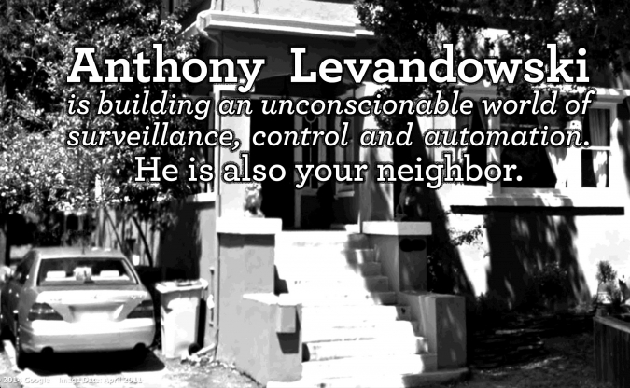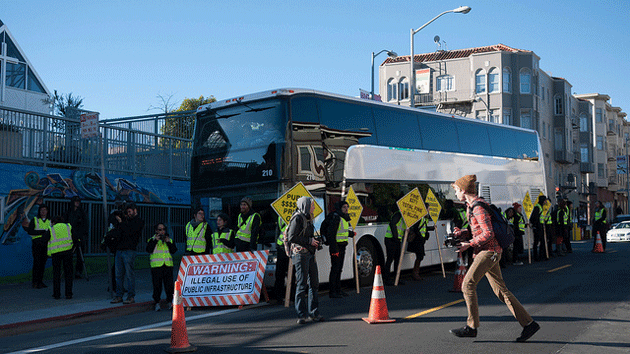
A tech shuttle protest in San Francisco, December 9, 2013. <a href="http://www.flickr.com/photos/42982698@N00/11295788563/in/photolist-idaSpe-95u47h-4Cat5j-7guSRW-3aho56-w71Sb-7guYeq-6AJx6G-4qhWA-9QSLke-6RdFKt-2BDfVG-2BDfXY-wwwoD-7gqWBa-7u5pND-5eEidp-5eJG6b-5eEiee-9o1FrD-hyTdBB-95EUkh-6xPmun-95BQzc-95ETCb-68KfKD-dCmPbi-7fPJ8E-7fPJfY-dasjZG-epLQoD-5Sk2ez-c3AQEC-4TYRUM-4D6mvx-jDdRfr-2QpQdy-eMUeMv-nChmW-awADTY-dZyndz-oyj2-2QL7Bq-tpVn9-4nmMTT-2QkAM4-ciTnXf-xxuZf-jrSFn-N9B9y-68XKYi" target="_blank">David Shamma</a>/Flickr
Earlier this month, the Bay Area Council, a coalition of Bay Area businesses, commissioned EMC Research to ask 500 likely voters in San Francisco how they felt about the much discussed commuter shuttles that take people from The City, Oakland, and Berkeley to tech-company campuses in Silicon Valley. The EMC researchers wrote in the ensuing report (PDF), released this week, “Despite what it might look like from recent media coverage, a majority of voters have a positive opinion of the shuttle buses and support allowing buses to use MUNI stops.” (MUNI is San Francisco’s municipal transportation agency.)
But I’m not so sure that rosy conclusion is warranted. For starters, Bauer’s Intelligent Transportation, which contracts with several tech companies to provide bus service, is a member of the Bay Area Council. So are Google, Facebook, and Apple. There’s also the fact that the survey found an awful lot of shuttle riders to poll. Six percent of respondents said that they rode one of the shuttle buses. Now, estimates of shuttle bus ridership vary wildly, but San Francisco’s total population is only about 836,000—six percent of which is about 50,000. A spokeswoman from the San Francisco Municipal Transit Agency recently told me that an estimated 4,125 San Franciscans ride the tech buses. That’s closer to 0.5 percent of city residents. The San Francisco Examiner points out that the survey excluded Spanish speakers.
And then there’s the delicate phrasing of the survey questions. Last week, Pacific Standard had a great little post explaining why surveys are not always accurate measures of public opinion. The post looks at a recent survey conducted about the movie Noah. The group Faith Driven Consumer asked respondents: “As a Faith Driven Consumer, are you satisfied with a Biblically themed movie—designed to appeal to you—which replaces the Bible’s core message with one created by Hollywood?” Unsurprisingly, 98 percent said they were not satisfied. Variety reported the survey’s findings in a story titled “Faith-Driven Consumers Dissatisfied With Noah, Hollywood Religious Pics.”
I thought of the Noah survey as I read the the tech-shuttle survey’s script. Here are two examples of the questions, plus the percentage of respondents who strongly agreed with the given statements.
Please tell me if you strongly agree, somewhat agree, somewhat disagree, or strongly disagree with the following statements:
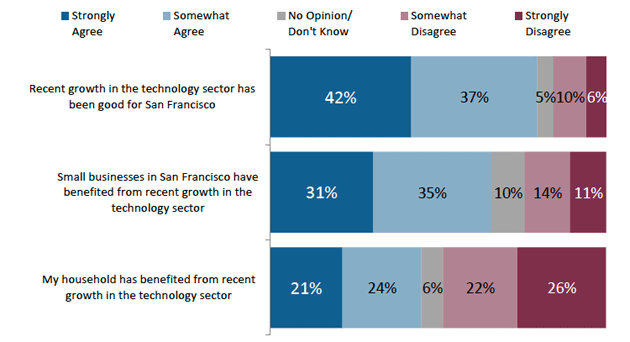 Image courtesy of Bay Area Council
Image courtesy of Bay Area Council
Now, thinking specifically about employee shuttle buses in San Francisco, please tell me if you strongly agree, somewhat agree, somewhat disagree, or strongly disagree with each of the following statements:
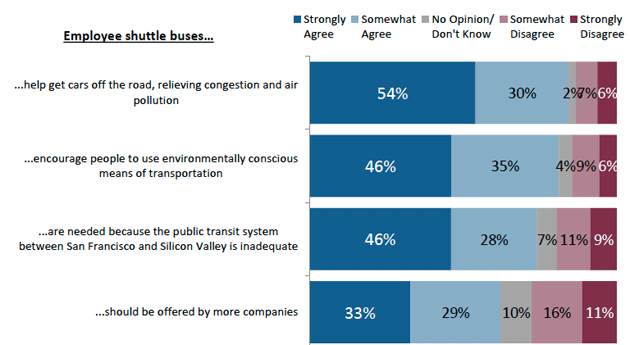
To be fair, the survey did include a few questions that allowed respondents to express negative opinions about the buses. But those questions tended to include loaded language. For example:
Now, thinking specifically about shuttle buses in San Francisco, please tell me if you strongly agree, somewhat agree, somewhat disagree, or strongly disagree with the following statements:
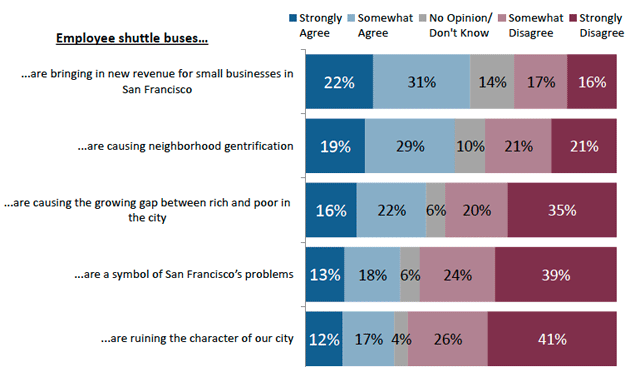
I’m guessing that if the word “causing” had been replaced with “contributing to,” more people would have agreed with the statement. Same if the word “ruining” had been replaced with “changing.”
Rufus Jeffris, the vice president for communications and major events at the Bay Area Council, wrote to me in an email that the Council stands by the survey. “The poll was intended to provide some broader context and perspective on some of the wrenching and painful issues we’re dealing with,” he wrote. “We feel strongly that scapegoating a single type of worker and single industry is not productive and does not move us forward to solutions.”

